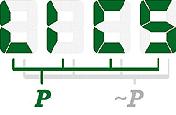Paper: Mean-Payoff Parity Games (at LICS 2005)
Authors: Krishnendu Chatterjee Thomas A. Henzinger Marcin JurdzinskiAbstract
Games played on graphs may have qualitative objectives, such as the satisfaction of an ?-regular property, or quantitative objectives, such as the optimization of a realvalued reward. When games are used to model reactive systems with both fairness assumptions and quantitative (e.g., resource) constraints, then the corresponding objective combines both a qualitative and a quantitative component. In a general case of interest, the qualitative component is a parity condition and the quantitative component is a mean-payoff reward. We study and solve such mean-payoff parity games. We also prove some interesting facts about mean-payoff parity games which distinguish them both from mean-payoff and from parity games. In particular, we show that optimal strategies exist in mean-payoff parity games, but they may require infinite memory.
BibTeX
@InProceedings{ChatterjeeHenzinger-MeanPayoffParityGam,
author = {Krishnendu Chatterjee and Thomas A. Henzinger and Marcin Jurdzinski},
title = {Mean-Payoff Parity Games},
booktitle = {Proceedings of the Twentieth Annual IEEE Symp. on Logic in Computer Science, {LICS} 2005},
year = 2005,
editor = {Prakash Panangaden},
month = {June},
pages = {178--187},
location = {Chicago, USA},
publisher = {IEEE Computer Society Press}
}
